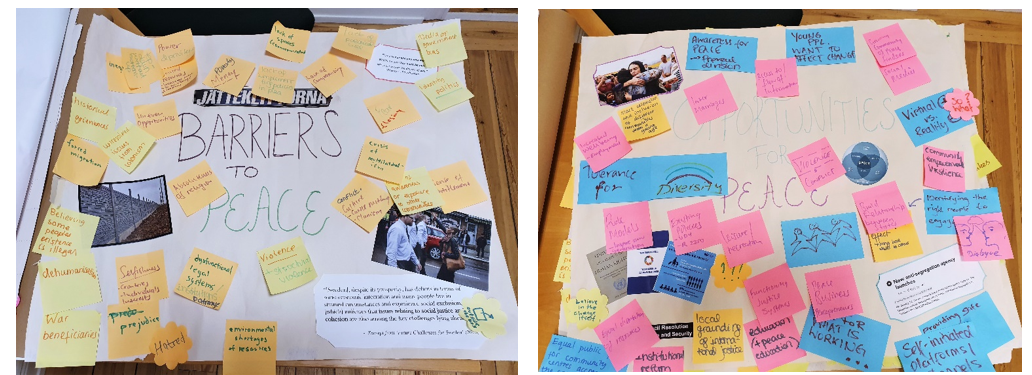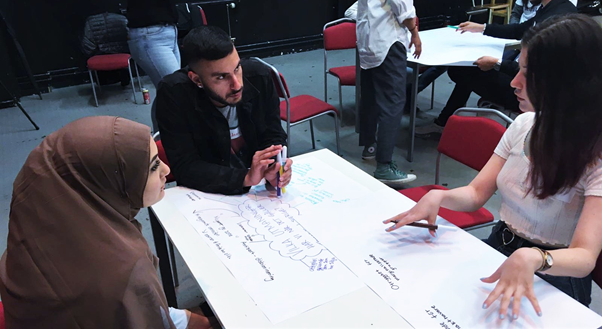Peace begins with people:
On the need for peacebuilding in Sweden
’Peace’ is a word likely existing in every language of the world. It is something that the vast majority of people want and something that, for most, is seen as the ultimate achievement for societies all over the world. Despite this, ‘peace’ is a concept that can be very difficult to explain. In the peacebuilding world there is a broad understanding that peace is multifaceted and is expressed in numerous ways. The historical, traditional view that peace is achieved once an armed conflict ends (for instance when a peace agreement is signed between warring factions) is no longer adequate. Today there is an increased understanding of the fact that peace does not automatically appear once armed conflict ceases. It is when there are processes, structures and relationships in place that continually contribute to the prevention of violent conflict and the bringing together of people that peace can grow.[1] Peace is based on the presence of notions such as justice and equality. This broader understanding of peace as something that goes beyond the absence of violent conflict, which is the basis for the Life & Peace Institute’s (LPI’s) approach, makes a few things abundantly clear:
1. Peace cannot be understood as a static end destination. Peace is, rather, a continuous process where events in the very local community to the larger national community, impacts a society’s degree of peacefulness. Societies can, consequently, be more or less peaceful.
2. Even countries that have traditionally been perceived as peaceful such as Sweden, would benefit from tools and methods traditionally used in peacebuilding. Particularly if one works, as LPI does, from the basis that conflicts are inevitable in a society (though they need not turn violent).
3. Peace is everyone’s responsibility and something that all people in a society need to contribute to in order for it to last.

LPI’s understanding of peace is based on the organisation’s 35-year old history of working in partnership with others in the Horn of Africa. We also, as already pointed out, understand that conflicts do not necessarily need to turn violent but can rather, if the right conditions are met, be a source of positive transformation. Our story gives more insight into our views on this and how our understanding of peace has developed over the years.
With this understanding of LPI’s view on peacebuilding work and conflict it may perhaps not seem so strange that this international peacebuilding institute decided to start its Sweden Programme in 2018. The decision to work with peacebuilding in Sweden was founded on two predominant factors: the observations we made in Swedish society as well as the need and mandate to work with the 2030 Agenda for Sustainable Development and UN resolution 2250 on Youth, Peace and Security in all countries, including Sweden.
It was to a large extent the events of 2015 and the impact these had on both Swedish politics as well as the public discourse of the Swedish population that made LPI turn its gaze towards Sweden. Escalating war in countries such as Syria and an increasingly desperate financial situation for people in countries suffering from famine and climate change led to the largest number of refugees since the Second World War seeking refuge in Europe. This led to significant changes in Sweden as well as in other countries in terms of, for instance, more restrictive immigration policies and a polarised public discourse on immigration. It is, however, important to emphasise that the reason why LPI has established a Programme in Sweden and wants to continually engage with peacebuilding work in Sweden goes beyond the polarised debate on migration. After having turned its gaze towards Sweden, from 2018 and beyond, it has become clear that there are challenges in Sweden that go beyond this debate. LPI has seen examples of polarisation among different groups of the population, which is illustrated both in political polarisation and perceived tensions between different groups in society along identity lines. There has also been a perceived decrease in trust in and frustration with the state. To be frank: there is more talk of an ‘us’ and a ‘them’ in Sweden today. Minority groups, such as the Sami and the Roma, bear witness of everyday racism and threats while places of religious worship have become more exposed to hate crime and vandalisation. These trends are not necessarily new. Some of these issues are structural and have been present in Sweden to different degrees for a long time. Some of them were, however, brought into the open in a more evident way in 2015 and in events since then.
In relation to the ongoing Covid-19 pandemic, a study by the Public Health Authority shows that there are discrepancies between groups in Sweden when it comes to number of cases and number of deaths, with foreign-born individuals from certain countries being more exposed than those who are born in Sweden.[2] The global Black Lives Matter demonstrations (which also took place in solidarity in Sweden), and the events which gave cause to them, also illustrate how countries traditionally perceived as peaceful must look within their societies and openly face structural injustices in order to correct these. Peacebuilding tools and methods will be critical to process resulting traumas, contribute to reconciliation and create the preconditions for a more equal, sustainable peace going forward.
LPI has continuously since 2018 gathered information on the developments in Sweden in the form of a ‘context analysis’ to get a better understanding of what the challenges are and possible strategies to face these. These observations then continuously feed into and influence LPI’s work in Sweden. Some of these observations will also be shared in LPI’s ongoing research project on peace and social cohesion in Sweden, which is expected to be published at the close of 2020.

LPI has been listening to the experiences of youth through multiple events and workshops since 2018 where it has become evident that young people in Sweden clearly see the challenges to peace in Sweden. This was apparent also when LPI together with Fryshuset and Operation 1325 recently arranged the event ‘Our Sweden’ on 17 June 2020 in Stockholm, Sweden.[3] LPI contributed with the thinking from its ongoing research project around peace and social cohesion in Sweden and specifically presented the three overarching themes to frame the discussion: trust/distrust, inclusion/ exclusion and security/insecurity.[4] The young participants shared their experiences based on these themes. From the individual experiences, a common thread emerged of the existence of two different ‘Swedens’: one Sweden for those more privileged and one Sweden that is only visible to those who belong to another group. According to the participants, there are several challenges for Sweden when it comes to creating a Sweden that encourages the trust, inclusion, and security of all young people in Sweden. Some themes that were raised were issues surrounding discrimination, prejudice, and structural racism.
“You see it every day. It’s a part of society. Very many people who are disadvantaged financially live in socioeconomically vulnerable areas [and are] people of colour[1] who are discriminated against, they often end up in bad environments – often criminal – because that is their only way out, what they see at the time because they see this whole image of the life that is available for them […]” – young participant in ‘Our Sweden’
Sweden is often mentioned as being one of the most peaceful countries in the world. For many, Sweden is a country where they feel trusting, included and secure. But that is not the case for everyone – and that means that there is a need for peacebuilding in Sweden. The 2030 Agenda – and Sweden’s commitment to achieve all of the 17 Sustainable Development Goals in Sweden – provides a great opportunity to talk about improvements that are needed to achieve a socially, financially and environmentally sustainable Sweden for all. There are several incredible organisations and individuals who are building peace in Sweden every single day. LPI seeks to be an ally to these and contribute with its knowledge to build a Sweden that fully lives up to the commitments the country has signed up for with 2030 Agenda and UN resolution 2250 on Youth, Peace, and Security. In order to achieve a truly peaceful and inclusive Sweden – where all young people are actively given the opportunity to participate – everyone needs to be included.
Peace begins with people. And Sweden is no exception.
[1] In the academic world we speak of negative and positive peace, respectively. These terms were coined by the Norwegian peace researcher Johan Galtung.
[2] https://www.folkhalsomyndigheten.se/nyheter-och-press/nyhetsarkiv/2020/juni/fodelseland-och-risken-att-drabbas-av-covid-19/
[3] The organisers shared guidelines that abided by the recommendations set forward by the Public Health Authority in relation to Covid-19 with the participants of the event. The number of participants was also kept below the limit of 50 stipulated by the Public Health Authority.
[4] The last theme (security/insecurity) cannot be adequately translated into English with one word. The Swedish term is ‘trygghet’ which denotes a sense of security as well as safety. It implies physical security but also goes beyond and touches on a person’s experiences and perceptions, which goes beyond perceptions of physical safety and security.
[5] The original Swedish quote uses the word ‘rasifierade’ which LPI broadly interprets to be synonymous with people of colour (POC) in English.
Most recent blog posts
2026-01-13
Placing Local Voices at the Centre of Regional Peacekeeping ConversationsA Reflection from the Horn Dialogue Series IV
